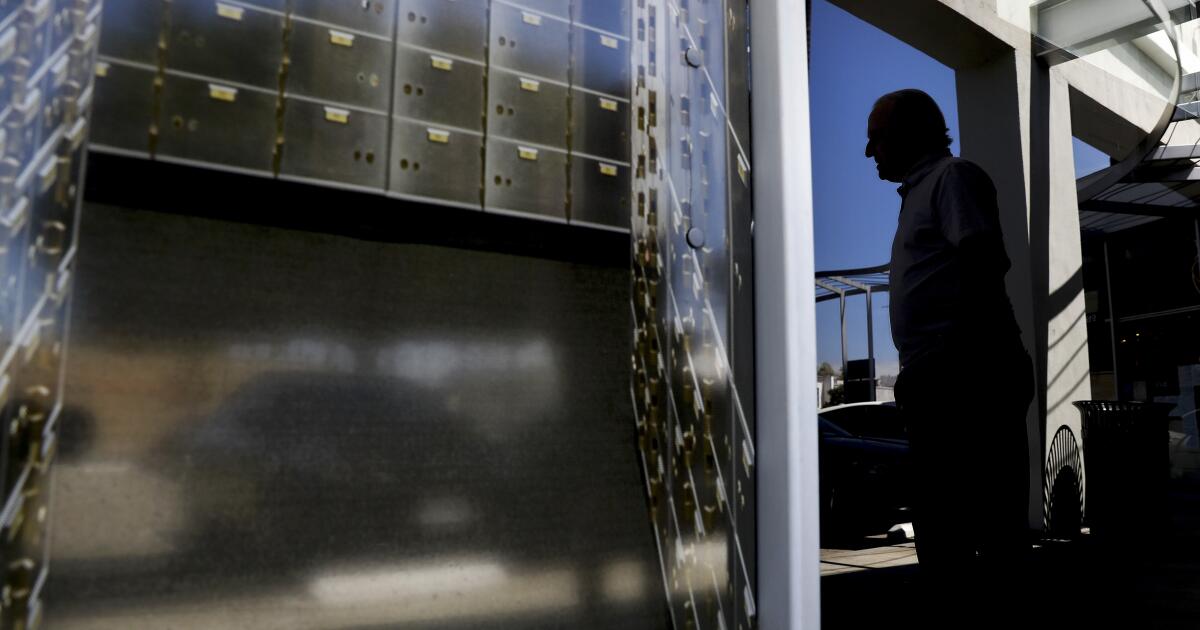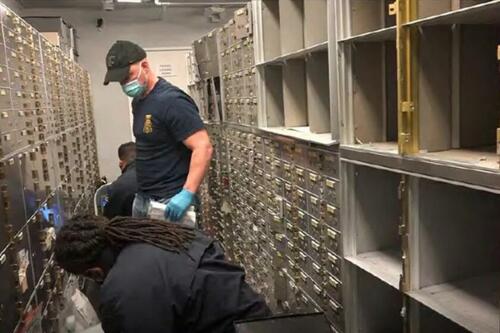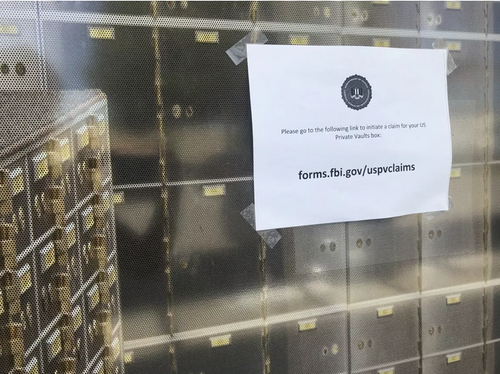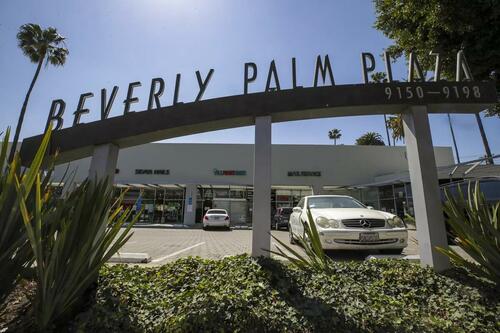MONDAY, SEP 26, 2022 - 07:20 PM

 www.latimes.com
www.latimes.com
The FBI 'drilled and pried' their way into 1,400 safe-deposit boxes at a private vault company in Beverly Hills after misleading a judge about their plan to permanently confiscate everything inside every boxcontaining at least $5,000 in cash or goods, a senior FBI agent recently testified.

At the end of the operation, agents had recovered more than $86 million in cash, and a 'bonanza' of gold, silver, rare coins, jewelry and other items of value.
Now, around 700 box holders who aren't implicated in any crimes liken the raid to police barging into a building's 700 apartments and taking every tenant's possessions when the only evidence of wrongdoing is against the landlord.
After the raid, the FBI posted a notice in the store window where customers could claim their property. Those who came forward had their bank records, state tax returns, DMV files and criminal histories investigated, agents testified.

Since the raid, the US attorney's office has attempted to block public disclosure of court papers which revealed the government's deception - however a judge rejected their request to keep them under seal
The origins of the raid date back to 2015, when local detectives and federal agents spotted drug suspects walking in and out of US Private Vaults, located in an upscale strip mall. Customers, who could rent boxes anonymously, entered the store's vault using a biometric eye scan according to a LA County sheriff's deputy.

By 2019, the feds and local law enforcement were able to search more than a dozen boxes, from which around $5 million was seized from five drug dealers, a bookie and a debit card thief. Then, the FBI began investigating the business itself - charging them with conspiracy to sell drugs and launder money, using a precious-metals store next door to help drug dealers launder cash by converting it to gold and silver, which was then stashed in their anonymous boxes. The company pleaded guilty to a conspiracy to launder drug money in an ongoing investigation.
Both the FBI and US attorney's office have denied misleading the judge or ignoring his conditions - claiming that they had no obligation to tell him about their plan for indiscriminate confiscations based on the blanket assumption that every customer was hiding assets tied to potential crimes.
According to FBI spokeswoman Laura Eimiller, the warrants were lawfully executed "based on allegations of widespread criminal wrongdoing," adding "At no time was a magistrate misled as to the probable cause used to obtain the warrants."
How the FBI worked the system
FBI agent Lynne Zellhart, a former Sacramento attorney, made sweeping allegations of criminal wrongdoing by box holders - arguing that it would be "irrational" for anyone not breaking the law to store assets at US Private Vaults, when a bank could better safeguard them.
"Only those who wish to hide their wealth from the DEA, IRS, or creditors would" rent a box anonymously at US Private Vaults, she wrote.
To provide cover for the fact that innocent box holders might be swept up, she admitted that US Private Vaults tried "to attract a non-criminal clientele as well, so as not to be too obvious a haven for criminals."
At her deposition, Zellhart was asked, "Was it your opinion that most of the people who rented safe-deposit boxes were criminals in some way?" to which she replied "I was expecting a lot of criminals," adding "I don't know about most."
The FBI assured US Magistrate Judge Steve Kim that the FBI would respect customers' rights based on the affidavit's 84th and 85th pages, written by assistant US attorney Andrew Brown, who underlined the government's lack of evidence to justify any criminal search of the customers' property.
"The warrants authorize the seizure of the nests of the boxes themselves, not their contents," Brown's section of the affidavit read. "By seizing the nests of safety deposit boxes themselves, the government will necessarily end up with custody of what is inside those boxes initially."
Judge Kim was explicit in limiting the scope of the raid, writing: "This warrant does not authorize a criminal search or seizure of the contents of the safety deposit boxes." He then gave the FBI permission to take inventory of box contents to protect against accusations of theft, and then ordered agents to notify owners not implicated in crimes so that they could recover their property

FBI misled judge who signed warrant for Beverly Hills seizure of $86 million in cash
Newly unsealed court documents show that the FBI and U.S. attorney’s office in L.A. got the warrant for the raid by misleading the judge who approved it.
The FBI 'drilled and pried' their way into 1,400 safe-deposit boxes at a private vault company in Beverly Hills after misleading a judge about their plan to permanently confiscate everything inside every boxcontaining at least $5,000 in cash or goods, a senior FBI agent recently testified.

The FBI and US attorney's office in Los Angeles justified the 5-day dragnet forfeiture at the US Private Vaults store by assuming that hundreds of anonymous box holders were storing assets somehowtied to unknown crimes.They rummaged through personal belongings of a jazz saxophone player, an interior designer, a retired doctor, a flooring contractor, two Century City lawyers and hundreds of others.
Agents took photos and videos of pay stubs, password lists, credit cards, a prenuptial agreement, immigration and vaccination records, bank statements, heirlooms and a will, court records show. In one box, agents found cremated human remains. -LA Times
At the end of the operation, agents had recovered more than $86 million in cash, and a 'bonanza' of gold, silver, rare coins, jewelry and other items of value.
Now, around 700 box holders who aren't implicated in any crimes liken the raid to police barging into a building's 700 apartments and taking every tenant's possessions when the only evidence of wrongdoing is against the landlord.
"The government did not know what was in those boxes, who owned them, or what, if anything, those people had done," said their lawyer, Robert Frommer. "That’s why the warrant application did not even attempt to argue there was probable cause to seize and forfeit box renters’ property."The plaintiffs in the class-action suit have asked U.S. District Judge R. Gary Klausner to declare the raid unconstitutional. If he grants the request, it could force the FBI to return millions of dollars to box holders whose assets it has tried to confiscate.
It could also spoil an unknown number of criminal investigations by blocking prosecutors from using any evidence or information acquired in the raid, including guns and drugs. -LA Times
After the raid, the FBI posted a notice in the store window where customers could claim their property. Those who came forward had their bank records, state tax returns, DMV files and criminal histories investigated, agents testified.

Since the raid, the US attorney's office has attempted to block public disclosure of court papers which revealed the government's deception - however a judge rejected their request to keep them under seal
The origins of the raid date back to 2015, when local detectives and federal agents spotted drug suspects walking in and out of US Private Vaults, located in an upscale strip mall. Customers, who could rent boxes anonymously, entered the store's vault using a biometric eye scan according to a LA County sheriff's deputy.

By 2019, the feds and local law enforcement were able to search more than a dozen boxes, from which around $5 million was seized from five drug dealers, a bookie and a debit card thief. Then, the FBI began investigating the business itself - charging them with conspiracy to sell drugs and launder money, using a precious-metals store next door to help drug dealers launder cash by converting it to gold and silver, which was then stashed in their anonymous boxes. The company pleaded guilty to a conspiracy to launder drug money in an ongoing investigation.
Both the FBI and US attorney's office have denied misleading the judge or ignoring his conditions - claiming that they had no obligation to tell him about their plan for indiscriminate confiscations based on the blanket assumption that every customer was hiding assets tied to potential crimes.
According to FBI spokeswoman Laura Eimiller, the warrants were lawfully executed "based on allegations of widespread criminal wrongdoing," adding "At no time was a magistrate misled as to the probable cause used to obtain the warrants."
How the FBI worked the system
FBI agent Lynne Zellhart, a former Sacramento attorney, made sweeping allegations of criminal wrongdoing by box holders - arguing that it would be "irrational" for anyone not breaking the law to store assets at US Private Vaults, when a bank could better safeguard them.
"Only those who wish to hide their wealth from the DEA, IRS, or creditors would" rent a box anonymously at US Private Vaults, she wrote.
In fact, Zellhart only mentioned nine box holders who she said were "linked" or "associated" with law enforcement investigations - and again provided no facts specifying criminal conduct.But the FBI’s evidence against customers was thin.
Agents had seen some of them pull up to the store in vehicles with Nevada, Ohio and Illinois license plates, Zellhart wrote.
“Based on my training and experience in money laundering investigations, Chicago, Illinois is a hub of both drug trafficking and money laundering,” she said. “I believe these patrons were using their USPV box to store drug proceeds.” She cited no facts to back up the suspicion. -LA Times
To provide cover for the fact that innocent box holders might be swept up, she admitted that US Private Vaults tried "to attract a non-criminal clientele as well, so as not to be too obvious a haven for criminals."
At her deposition, Zellhart was asked, "Was it your opinion that most of the people who rented safe-deposit boxes were criminals in some way?" to which she replied "I was expecting a lot of criminals," adding "I don't know about most."
The FBI assured US Magistrate Judge Steve Kim that the FBI would respect customers' rights based on the affidavit's 84th and 85th pages, written by assistant US attorney Andrew Brown, who underlined the government's lack of evidence to justify any criminal search of the customers' property.
"The warrants authorize the seizure of the nests of the boxes themselves, not their contents," Brown's section of the affidavit read. "By seizing the nests of safety deposit boxes themselves, the government will necessarily end up with custody of what is inside those boxes initially."
Under US forfeiture laws, the government must have evidence that it was derived from criminal conduct or used to facilitate it.The affidavit told Kim that agents would “follow their written inventory policies” and “attempt to notify the lawful owners of the property stored in the boxes how to claim their property.”
Under FBI policy, it said, inspection of each box would “extend no further than necessary to determine ownership.” But agents’ inspection of the boxes went substantially further — just as the government planned, according to FBI records filed in court.
By the time Kim got the warrant request, the FBI had been preparing an enormous forfeiture operation for at least six months, according to Jessie Murray, the chief of the FBI’s asset forfeiture unit in Los Angeles. -LA Times
Judge Kim was explicit in limiting the scope of the raid, writing: "This warrant does not authorize a criminal search or seizure of the contents of the safety deposit boxes." He then gave the FBI permission to take inventory of box contents to protect against accusations of theft, and then ordered agents to notify owners not implicated in crimes so that they could recover their property






